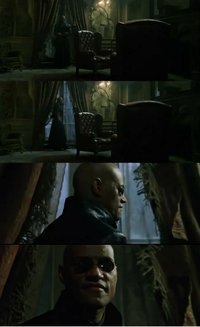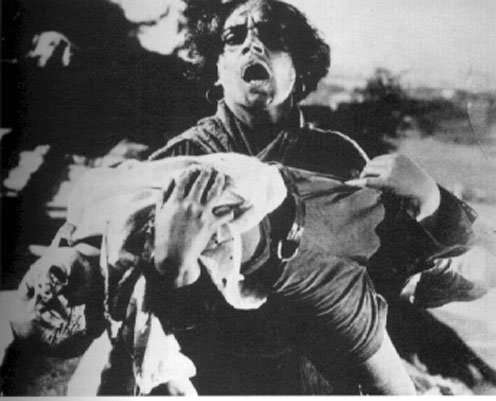For some days I will be sharing with you a little research I have done, it is the seventh art, the cinema, how was it born? Who have been the protagonists of this story? What technological innovations allowed the birth of this art? I will be answering these and other questions, I hope you enjoy it!
If we define the cinema as telling a story through moving images, we could say that the human being invented it many centuries ago, using the magic lantern to cite an example, but today we will talk about the cinema that we all know.
In order to talk about it, we have to take into account certain technological factors, since the stories were there, what did not exist as a way of capturing moving images and then projecting them.
The era of innovation and inventions
Then Thomas Edison patented the kinetoscope, invented by one of his employees, who was the first precursor of the film projector. It worked individually, that is, only one person could see the "movie" that were usually short documentaries.
However, although Edison was close, it was not he who invented the cinema, since he did not have the vision to innovate and realize that if he made the movies to be seen by groups and not by people alone, he could make much more money, he thought that if he did this it would kill the goose that lays the golden eggs.
His invention traveled the world of those days, and in France, two ingenious brothers created the apparatus that marked the beginning of the wonderful art of cinema, the cinematograph, described by the people of that time as amazing, for its ability to record, project and just weigh 10 pounds.
His first screening was a day of the innocents of the late nineteenth century, exactly on December 28, 1895, for this reason, is that day we celebrate the day of cinema. The presentation was an immediate success, since the Lumière brothers instead of using the Edison method, they projected the images onto a white cloth on the wall (a practice that continues to this day), the publicity that was made by the people who were there present made that the invention spread rapidly around France, in addition to the brothers hired people to do recordings in every corner of the planet, made the invention became quickly known throughout the world.
However, although the technology was already available at that time, there is still no "real cinema", if we remember our definition, we still do not tell stories in the films that are screened, just by looking at their titles we can imagine:
- Workers Leaving the Lumiere Factory (La Sortie de l'usine Lumière à Lyon)
- The Arrival of the Mail Train (L'arrivée d'un Train)
- Demolition of a Wall (Le Mur)
That's why for me in particular, the inventors of the cinema are not the Lumière but Georges Méliès, one of the viewers of the first projection of 1895, a man who had an extraordinary vision to convert cinema into what it is today.

Who was the first man to set foot on the moon? Armstrong, you say? Well, I say it was Méliès.
The revolution of the narration
Méliès was the son of a major French industrialist, his father wanted him to continue with the business, but he refused because he wanted to be a great magician, so when he observed the cinematograph, he looked at great potential in its use for its tricks, however, as it usually happens, no one saw what he saw, they did not even want to sell him the cinematograph for his ideas, so he had to figure out to get a similar device.
Experimenting with his "camera" Georges realized that he could perform "special effects" with certain techniques during filming, events that began the narrative development and allowed to tell true stories.

This was something truly innovative at that time, and it marked a turning point because, after that, many other great characters came along who shaped the cinema to what we have today. Among them:
Edwin S. Porter, an employee of Edison, is known to be considered the father of the genre "Wéstern", was one of the pioneers of American cinema to make competition with European films.
David Wark Griffith. Just as mathematics and all sciences and arts have a language, cinema also has it, and it was Griffith who created it. Invisible assembly? Flashback? Foreground? They're concepts created by David, it isn't that he invented it, it's that he was the one who created the nomenclature, it should be noted that he was a prolific actor, director, and film producer.
So far, there have been many advances in film, however, the recording and editing remains virtually the same, it's (as an example see the invisible montage) that the public does not see the changes in the scenes, they had to show him absolutely everything that happened, but with the next character, things changed.
Serguéi Eisenstein, director of Soviet cinema, a fundamental piece for the assembly as we conceive it today. Eisenstein realized the potential that cinema had to manipulate the feelings and emotions of people, so with the support of the communist government of Russia at that time he developed his own theory of montage, which was then used by filmmakers from all over the world.
It's said that in one of Eisenstein's experiments, a group of people was placed to see images in a certain order:
First, there was the image of a man with a face without expression, then a cup of soup.
The image of the same man was returned, with the same expression, then changed to a scene with a baby in a coffin.
Then, the same thing, the image of the gentleman and a few moments later he showed himself to a beautiful woman.
The experiment of which I speak to you, it's short, I recommend that you see it so that you understand better. You can find similar videos of different movies on YouTube, it's called: Kuleshov Effect. Source
What did the public say? "That man is a great actor", they commented. "First he was hungry, helpless, then sad and desolate and finally he was lustful before that woman."
What can we conclude from this experiment? That it isn't necessary to put everything in the film, people can fill the empty spaces, if the correct images are placed, besides that this is more impressive for them.
And after all, this is what they want, to impact us, it isn't fair to give your money to see a movie that does not make you feel anything, it would be a fraud.

This is the fundamental history of cinema, try to cover more would be too long for both, what comes after is movies and movies, soon I will talk about the birth of cinema in Venezuela, I hope that this reading has been liked for you. Thank you for reading!
Sources consulted:
Cinematograph Kinetoscope The Lumière In case you want to communicate with me, do it by Discord: @julioccorderoc#9500 Author: @JulioCCorderoC This work, belongs only and exclusively to my authorship. Under The Digital Millenium Copyright Act Of 1998. © 2018 All rights reserved. steemit.com/@julioccorderoc | Terms & Conditions of Use | Privacy Policy
Greetings.
The texts and images where it is not specified otherwise, are my property.

Esta obra está bajo una Licencia Creative Commons Atribución-NoComercial-CompartirIgual 4.0 Internacional.

Posted from my blog with SteemPress : http://freetech.rockdio.org/history/birth-of-the-seven-art/








Congratulations! This post has been upvoted from the communal account, @minnowsupport, by julioccorderoc from the Minnow Support Project. It's a witness project run by aggroed, ausbitbank, teamsteem, theprophet0, someguy123, neoxian, followbtcnews, and netuoso. The goal is to help Steemit grow by supporting Minnows. Please find us at the Peace, Abundance, and Liberty Network (PALnet) Discord Channel. It's a completely public and open space to all members of the Steemit community who voluntarily choose to be there.
If you would like to delegate to the Minnow Support Project you can do so by clicking on the following links: 50SP, 100SP, 250SP, 500SP, 1000SP, 5000SP.
Be sure to leave at least 50SP undelegated on your account.
Este Post ha sido votado por delega, un pool de SP patrocinado por: @betamusic y @nnnarvaez para apoyar tu crecimiento y el contenido de calidad.
Un proyecto del Witness: @castellano (si quieres formar parte, contactales)
vaya @julioccorderoc que post tan hermosamente estructurado, me ha gustado mucho tu publicación amigo
Si estas interesada, lo tengo en español. Gracias por pasarte por aquí.